实验5
实验任务1
代码:
#include<stdio.h> #include<stdlib.h> #define N 4 int main() { int x[N]={1,9,8,4}; int i; int *p; for(i=0;i<N;++i) printf("%d",x[i]); printf("\n"); //方式2:通过指针变量遍历输出数组元素(1) for(p=x;p<x+N;++p) printf("%d",*p); printf("\n"); //方式2:通过指针变量遍历输出数组元素(2) p=x; for(i=0;i<N;++i) printf("%d",*(p+i)); printf("\n"); system("pause"); return 0; }
#include<stdio.h> #include<stdlib.h> int main() { int x[2][4]={{1,9,8,4},{2,0,4,9}}; int i,j; int *p; //指针变量,存放int类型数据的地址 int(*q)[4]; //指针变量,指向包含4个int类型元素的一维数组 //使用数组名、下标访问二维数组元素 for(i=0;i<2;++i) { for(j=0;j<4;++j) printf("%d",x[i][j]); printf("\n"); } //使用指针变量p间接访问二维数组元素 for(p=&x[0][0],i=0;p<&x[0][0]+8;++p,++i) { printf("%d",*p); if((i+1)%4==0) printf("\n"); } //使用指针变量q间接访问二维数组元素 for(q=x;q<x+2;++q) { for(j=0;j<4;++j) printf("%d",*(*q+j)); printf("\n"); } system("pause"); return 0; }
截图:
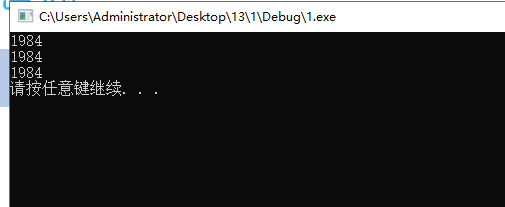

实验任务2
代码:
#include<stdio.h> #include<stdlib.h> #include<string.h> #define N 80 int main() { char s1[]="Learning makes me happy"; char s2[]="Learning makes me sleepy"; char tmp[N]; printf("sizeof(s1)vs.strlen(s1):\n"); printf("sizeof(s1)=%d\n",sizeof(s1)); printf("strlen(s1)=%d\n",strlen(s1)); printf("\nbefore swap:\n"); printf("s1:%s\n",s1); printf("s2:%s\n",s2); printf("\nswapping...\n"); strcpy(tmp,s1); strcpy(s1,s2); strcpy(s2,tmp); printf("\nafter,swap:\n"); printf("s1:%s\n",s1); printf("s2:%s\n",s2); system("pause"); return 0; }
#include<stdio.h> #include<stdlib.h> #include<string.h> #define N 80 int main() { char *s1="Learning makes me happy"; char *s2="Learning makes me sleepy"; char *tmp; printf("sizeof(s1)vs.strlen(s1):\n"); printf("sizeof(s1)=%d\n",sizeof(s1)); printf("strlen(s1)=%d\n",strlen(s1)); printf("\nbefore swap:\n"); printf("s1:%s\n",s1); printf("s2:%s\n",s2); printf("\nswapping...\n"); tmp=s1; s1=s2; s2=tmp; printf("\nafter,swap:\n"); printf("s1:%s\n",s1); printf("s2:%s\n",s2); system("pause"); return 0; }
截图:
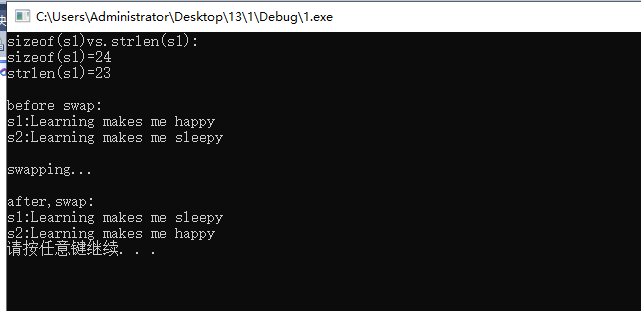
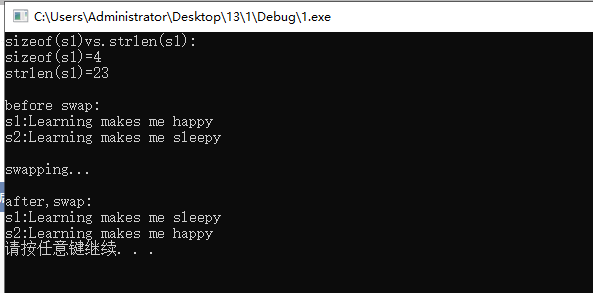
答案:
1.数组s1的大小是24,sizeof计算的是大小包括'0',strlen计算的是长度
2.不能,不能像这样直接声明一个没有确定大小的数组。字符串赋值只能一位一位的。
3.交换了
task2_2:
1.指针s1存放的是字符数组的首地址,sizeof计算的一个指针的大小,strlen计算的是长度
2.能
3.交换的是指针,储存单元中的内容没有交换
实验任务3
代码:
#include<stdio.h> #include<stdlib.h> void str_cpy(char *target,const char *source); void str_cat(char *str1,char *str2); int main() { char s1[80],s2[20]="1984"; str_cpy(s1,s2); puts(s1); str_cat(s1,"Animal Farm"); puts(s1); system("pause"); return 0; } void str_cpy(char *target,const char *source) { while(*target++=*source++) ; } void str_cat(char *str1,char *str2) { while(*str1) str1++; while(*str1++=*str2++) ; }
截图:
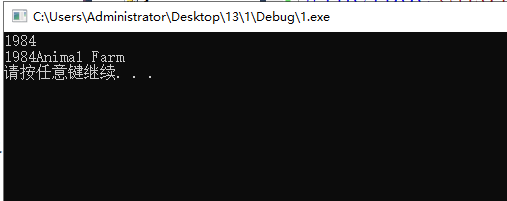
实验任务4
代码:
#include<stdio.h> #include<stdlib.h> #define N 80 int func(char *); int main() { char str[80]; while(gets(str)!=NULL) { if(func(str)) printf("yes\n"); else printf("no\n"); } system("pause"); return 0; } int func(char *str) { char *begin,*end; begin=end=str; while(*end) end++; end--; while(begin<end) { if(*begin!=*end) return 0; else { begin++; end--; } } return 1; }
截图:

实验任务5
代码:
#include <stdio.h> #define N 80 void func(char *); int main() { char s[N]; while (scanf("%s", s) != EOF) { func(s); puts(s); } return 0; } void func(char *str) { int i; char *p1, *p2, *p; p1 = str; while (*p1 == '*') p1++; p2 = str; while (*p2) p2++; p2--; while (*p2 == '*') p2--; p = str; i = 0; while (p < p1) { str[i] = *p; p++; i++; } while (p <= p2) { if (*p != '*') { str[i] = *p; i++; } p++; } while (*p != '\0') { str[i] = *p; p++; i++; } str[i] = '\0'; }
截图:
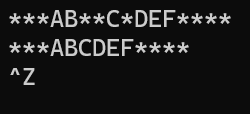
实验任务6
代码:
#include <stdio.h> #include <string.h> void sort(char *name[], int n); int main() { char *course[4] = {"C Program", "C++ Object Oriented Program", "Operating System", "Data Structure and Algorithms"}; int i; sort(course, 4); for (i = 0; i < 4; i++) printf("%s\n", course[i]); return 0; } void sort(char *name[], int n) { int i, j; char *tmp; for (i = 0; i < n - 1; ++i) for (j = 0; j < n - 1 - i; ++j) if (strcmp(name[j], name[j + 1]) > 0) { tmp = name[j]; name[j] = name[j + 1]; name[j + 1] = tmp; } }
#include <stdio.h> #include <string.h> void sort(char *name[], int n); int main() { char *course[4] = {"C Program", "C++ Object Oriented Program", "Operating System", "Data Structure and Algorithms"}; int i; sort(course, 4); for (i = 0; i < 4; i++) printf("%s\n", course[i]); return 0; } void sort(char *name[], int n) { int i, j, k; char *tmp; for (i = 0; i < n - 1; i++) { k = i; for (j = i + 1; j < n; j++) if (strcmp(name[j], name[k]) < 0) k = j; if (k != i) { tmp = name[i]; name[i] = name[k]; name[k] = tmp; } } }
截图:
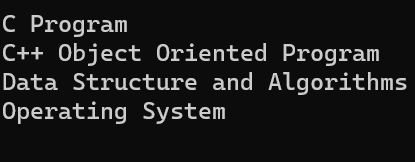
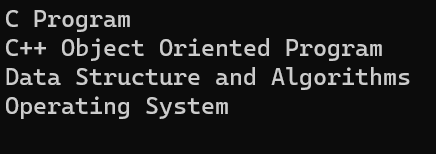
答案:交换的是内存中字符串的储存位置
实验任务7
代码:
#include <stdio.h> #include <string.h> #define N 5 int check_id(char *str); int main() { char * pid[N] = {"31010120000721656X", "330106199609203301", "53010220051126571", "510104199211197977", "53010220051126133Y"}; int i; for(i = 0;i < N; i++) if(check_id(pid[i])) printf("%s\tTrue\n", pid[i]); else printf("%s\tFalse\n", pid[i]); return 0; } int check_id(char *str) { int len = strlen(str); int i; if(len != 18) return 0; for(i = 0;i < len; i++) { char x = *(str + i); if(i == 17) { if((x >= '0' && x <= '9') || x =='X') continue ; else return 0; } else { if(x >= '0' && x <= '9') continue ; else return 0; } } return 1; }
截图:
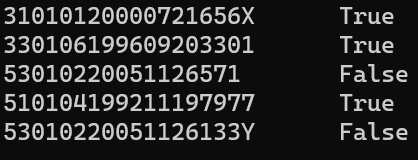
实验任务8
代码:
#include <stdio.h> #include <string.h> #define N 80 void encoder(char *s); void decoder(char *s); int main() { char words[N]; printf("输入英文文本:"); gets(words); printf("编码后的英文文本:"); encoder(words); printf("%s\n", words); printf("对编码后的英文文本解码:"); decoder(words); printf("%s\n", words); return 0; } void encoder(char *s) { int i, len; len = strlen(s); for(i = 0;i < len; i++) { char x; x = *(s + i); if((x >= 'a' && x <= 'z') || (x >= 'A' && x <= 'Z')) { if(x == 'z') *(s + i) = 'a'; else if(x == 'Z') *(s + i) = 'A'; else *(s + i) = x + 1; } } } void decoder(char *s) { int i, len; len = strlen(s); for(i = 0;i < len; i++) { char x; x = *(s + i); if((x >= 'a' && x <= 'z') || (x >= 'A' && x <= 'Z')) { if(x == 'a') *(s + i) = 'z'; else if(x == 'A') *(s + i) = 'Z'; else *(s + i) = x - 1; } } }
截图:






 浙公网安备 33010602011771号
浙公网安备 33010602011771号